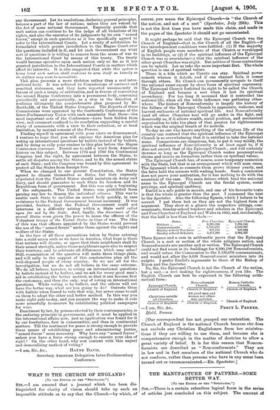WHAT IS THE CHURCH OF ENGLAND ?
[To ms EDITOR OF THE "SPECTATOR." J
am amazed that a journal which has been dis- tinguished for clarity of vision should take up such an impossible attitude as to say that the Church—by which, of
course, you mean the Episcopal Church—is "the Church of the nation, and not of a sect" (Spectator, July 28th). This is not the first time you have made this claim, and made in the pages of the Spectator it should not go uncontested.
It might perhaps be said that the Episcopal Church was the Church of England—that is, the Church of all the English—if two interdependent conditions were fulfilled : (1) If the majority of English people were members of that Church or worshipped in its buildings, or (2) if the spiritual influence of the Episcopal Church was so overwhelming that the spiritual influence of the other great Churches was slight. But neither of these contentions can be upheld. Let us take the more important first. The whole question is one of spiritual values. There is a tide which no Canute can stay. Spiritual power eometh whence it listeth, and if one channel fails, it comes through others. No Church can permanently arrogate to itself the national name except by sheer force of spiritual supremacy. The Episcopal Church forfeited its right to be called the Church of England and became a sect when it lost its spiritual ascendancy. For too long it assumed that it controlled the national life, when all the while influence was gathering other- where. The history of Nonconformity is largely the history of the failure of the Episcopal Church to appreciate, welcome, and harvest outbursts of national spiritual life. And Nonconformity (and all other Churches too) will go under in the fight, and deservedly so, if it allows wealth, social position, and mechanical organisation to take the place of that passion for righteousness which was the original breath of its nostrils.
To-day no one who knows anything of the religious life of the country can contend that the spiritual influence of the Episcopal Church is so overwhelming that it is entitled to take the national name. Comparisons are dangerous, but, to put it very mildly, the spiritual influence of Nonconformity is at least equal to, if it does not exceed, that of the Episcopal Church ; and will certainly increase so long as the Episcopal Church makes presumptuous claims and insists on formalism rather than on spiritual values.
The Episcopal Church has, of course, some temporary counexion with the State, but that is an arrangement which will soon cease. The ligament which so connects them grows thinner yearly, and the fates hold the scissors with waiting hands. Such a connexion does not prove your contention, for it has nothing to do with the essentials of the case. The main fetters which bind the national name to the Episcopal Church are the feudal system, social privilege, and spiritual snobbery.
Euclid is a safe guide in morals, and one of his favourite texts is that the whole is greater than the part. I commend the text to the Spectator. Also the following figures, which I believe to be correct. I put them last as they are not the highest form of argument. They show at a glance the respective sittings, com- municants, Sunday-school teachers and scholars in the Episcopal and Free Churches of England and Wales in 1905, and, incidentally, that the half is less than the whole :— Items. Free Churches. Episcopal Church. Sittings ... 8,290,388 7,294,145
Communicants 2,136,079 ... 2,168,967 Sunday-school Teachers ... 401,138 208,248 Sunday-school Scholars ... 3,471,392 ... 2,984,327
These figures and a sum in arithmetic prove that the Episcopal Church is a sect or section of the whole religious nation, and Nonconformists are another sect or section. The Episcopal Church could not find room in its buildings for 8,290,188 Nonconformists, and would refuse the Communion to the 2,136,079 communicants, and would not allow the 9,638 Nonconformist ministers into its pulpits. I prefer Euclid's arguments to those of the Bishop of Ripon and the Spectator.
No, Sir, the Episcopal Church is not the Church of the nation, but a sect,—a sect making for righteousness, if you like. The English Church can best be expressed in the following arith- metical form :
Episcopal Church. Church of England.
All good men and women not other- wise included.
Church of England. Nonconformist Roman Catholic
Church, Church. Church of England. + Church of England. 4.
Christians outside all Churches.
Church of England.
Church of England. PERCY L. PARKER.
—I am, Sir, &c., Ifield, Sussex.
[Our correspondent has not grasped our contention. The Church of England is the national Church because she does not exclude any Christian Englishmen from her ministra- tions if they are willing to use them, and because she is comprehensive enough in the matter of doctrine to allow a great variety of belief. It is for this reason that Noncon- formists are described as "Non-conformists." They are in law and in fact members of the national Church who do not conform, rather than persons who have in any sense been turned out or excommunicated.—En. Spectator.]






































 Previous page
Previous page